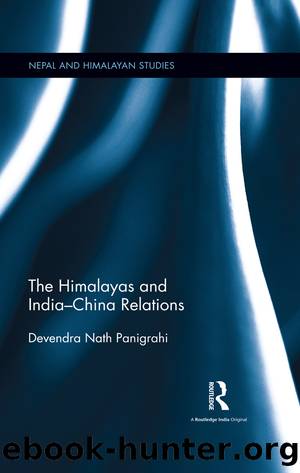The Himalayas and India-China Relations by Devendra Nath Panigrahi

Author:Devendra Nath Panigrahi [Panigrahi, Devendra Nath]
Language: eng
Format: epub
Tags: International Relations, Social Science, Political Science, History, General
ISBN: 9781317277453
Google: hl77CwAAQBAJ
Goodreads: 29943546
Publisher: Routledge
Published: 2016-04-14T00:00:00+00:00
There was also âsuper abundance of animal lifeâ, most of them precious for animal products, like the yak from which milk, butter, cheese, meat, skin, hides and so on were available for sustaining Tibetan life âin the bleak conditionsâ. Also, there were musk deer, which was declared the property of the state since âmuskâ was rare and valuable (ibid., p. 569). Another prized animal was known as the âshawl goatâ; it was not available anywhere in the world. Best shawls were produced from them (ibid., p. 570). The wild horse, the wild ass and the mule were found in abundance.
Immense flocks of sheep are pastured throughout Tibet, where mutton forms a considerable portion of the animal foodâ¦. The skins of lamb are cured with the wool on, and constitute a valuable article of Traffic. In order to obtain the skin in the highest degree of excellence the dam is sometimes killed before her time of yeaning, which ensures a silky softness to the fleece, and rendered it particularly fitted for the lining of vests, for which purpose it is in high estimation all over China and Tartary. (ibid., p. 570)
The discussions with Zhou Enlai were wide ranging, as is evident from what Jawaharlal Nehru had recorded in his minutes soon after their meetings in both India and China.
Zhou Enlai had visited India at the invitation of Nehru. His visit took place between 25 and 28 June 1954. J.L. Nehru paid a return visit to China in October 1954.
Chairman Mao along with Prime Minister Zhou Enlai met Jawaharlal Nehru on 19 October 1954. They reiterated âcommon bonds of friendship in historyâ and expressed themselves strongly against colonialism. Mao thought, âIt would be wrong to make war as an instrument of policyâ (Selected Works of Jawaharlal Nehru [SWJN], 1939, Vol. 27, p. 11).
Zhou Enlai raised the question of Dalai Lama. He said:
Dalai Lama was not friendly to us. I might mention that sometime ago [he] wanted to seek asylum in India. Sardar Panikkar [Indian ambassador to China] then raised the question with us and said that if Dalai Lama came to India, India will have to give him asylum and all facilities as a religious leader. We agreed. Actually, however, he went only some distance from Lhasa and came back. His brother and sister-in-law are still in India. And in fact, they may be having contacts with Tibet. We do not mind it.
(SWJN, Vol. 27, p. 20, italics added)
Download
This site does not store any files on its server. We only index and link to content provided by other sites. Please contact the content providers to delete copyright contents if any and email us, we'll remove relevant links or contents immediately.
Spell It Out by David Crystal(35861)
Life for Me Ain't Been No Crystal Stair by Susan Sheehan(35550)
Cecilia; Or, Memoirs of an Heiress — Volume 1 by Fanny Burney(32092)
Cecilia; Or, Memoirs of an Heiress — Volume 3 by Fanny Burney(31481)
Cecilia; Or, Memoirs of an Heiress — Volume 2 by Fanny Burney(31435)
The Great Music City by Andrea Baker(30931)
Professional Troublemaker by Luvvie Ajayi Jones(29445)
We're Going to Need More Wine by Gabrielle Union(18664)
Twilight of the Idols With the Antichrist and Ecce Homo by Friedrich Nietzsche(18324)
The Secret History by Donna Tartt(18267)
All the Missing Girls by Megan Miranda(14855)
Cat's cradle by Kurt Vonnegut(14804)
Pimp by Iceberg Slim(13828)
Bombshells: Glamour Girls of a Lifetime by Sullivan Steve(13718)
Fifty Shades Freed by E L James(12936)
Talking to Strangers by Malcolm Gladwell(12916)
Norse Mythology by Gaiman Neil(12879)
The Social Justice Warrior Handbook by Lisa De Pasquale(11969)
Underground: A Human History of the Worlds Beneath Our Feet by Will Hunt(11857)
